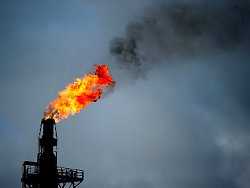Putin on the sidelines after invasion
Other autocrats should now supply energy
03/14/2022, 6:50 p.m
From the Western point of view, resources such as oil and gas are geographically unfavorably distributed – in autocratic countries such as Saudi Arabia, Venezuela and Qatar. Because the Kremlin disqualifies itself as a negotiating partner, those in power there are being courted.
In politics, problems are relative – even those with authoritarian governments. For years, Turkish President Recep Tayyip Erdogan, for example, was seen as an ever-increasing problem for the West and especially the Europeans. But now the invasion of Russia in neighboring Ukraine is causing a rethink: The EU governments and the NATO state Turkey are finding friendlier words for each other again – Chancellor Olaf Scholz completed his inaugural visit to Ankara today, Monday. Erdogan even agreed to try to reach an understanding with his intimate enemy Greece at the weekend. But Turkey is by no means the only country deemed difficult and with which the West is now forced to seek rapprochement. Venezuela and Saudi Arabia, which are rich in raw materials, are also being courted at the moment.
- Venezuela: The most blatant case is that of Venezuelan ruler Nicolas Maduro, who is ostracized by the US and the EU. For years, the United States had imposed sanctions on the country. But now the US government itself has sought the conversation and has promised easing. Not because the situation in the country has changed, but because the United States, after its oil embargo on Russia, is urgently looking for alternative sources of oil, gas and coal for itself and the Europeans. Venezuela, as one of the larger potential oil suppliers, could ensure that the international energy markets do not go haywire and prices do not continue to rise without Russia. Maduro doesn’t have a problem with that – he needs money. Venezuela’s Oil Association President Reinaldo Quintero said his country could increase capacity by 400,000 barrels a day.
- Saudi Arabia: Saudi Arabia has been criticized for its role in Yemen’s civil war and for the assassination of journalist Jamal Khashoggi. The relationship with Riyadh has therefore cooled down significantly. Just over the weekend, 81 people were executed in Saudi Arabia. Nevertheless, British Prime Minister Boris Johnson wants to travel to Saudi Arabia this week, the British “Times” reported. The US’s most important ally in the Middle East is not only one of the world’s largest oil producers, but also an opponent of Iran and a major buyer of Western arms. “We are not directly dependent as a country, but energy prices and access to energy are very important issues,” Health Minister Sajid Javid said. When asked about the human rights situation, he added: “I am pleased that we have a relationship where we can talk about human rights issues as well as our long-term relationship.”
- Qatar: A few weeks ago there was a discussion in Germany as to whether it was really a good idea to hold the soccer World Cup there in winter. From an ecological point of view, the World Cup in the hot desert state is considered questionable anyway, and human rights organizations have repeatedly criticized the situation in the Gulf country. But now Qatar is suddenly once again a beacon of hope for the West. Qatar is one of the world’s largest producers of liquefied natural gas (LNG). So last Wednesday, Deputy Prime Minister Sheikh Mohammed Abdulrahman bin Al-Thani was received in the Chancellery by State Secretary Jörg Kukies and the Chancellor’s foreign policy adviser, Jens Plötner. It should also have been about the short-term delivery of LNG and the planned construction of a liquid gas terminal in Brunsbüttel.
- Turkey: Turkey is neither a producer of natural gas nor oil, nor is it politically comparable to the countries mentioned. If only because of the large number of people of Turkish origin in Germany, there are many points of contact with Germany. But the NATO country has also established itself as an opponent to Russia in Libya and Syria. In addition, the country on the Bosporus controls the strategically important access to the Black Sea – and has currently prohibited all warships from passing through. In addition, Turkey is a transit country for some gas pipelines. These should not only transport Russian gas to the west, but also, if possible, gas from Iran, Azerbaijan and possibly Turkmenistan. That too could help reduce dependence on Russia.
But Azerbaijan and states such as Algeria and Egypt are also on the list of resource-rich countries with which contact has become more difficult in recent years, also due to human rights issues.
